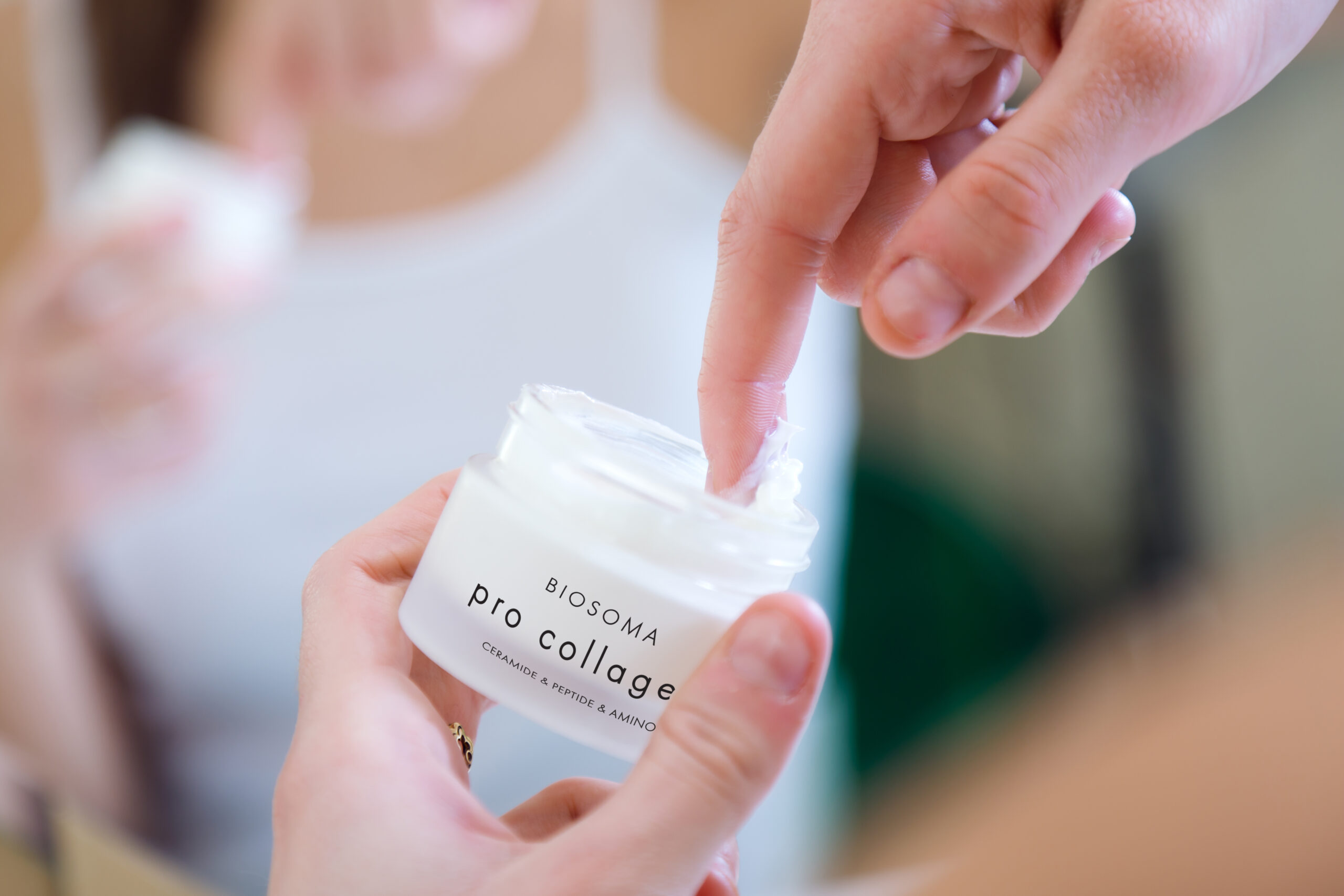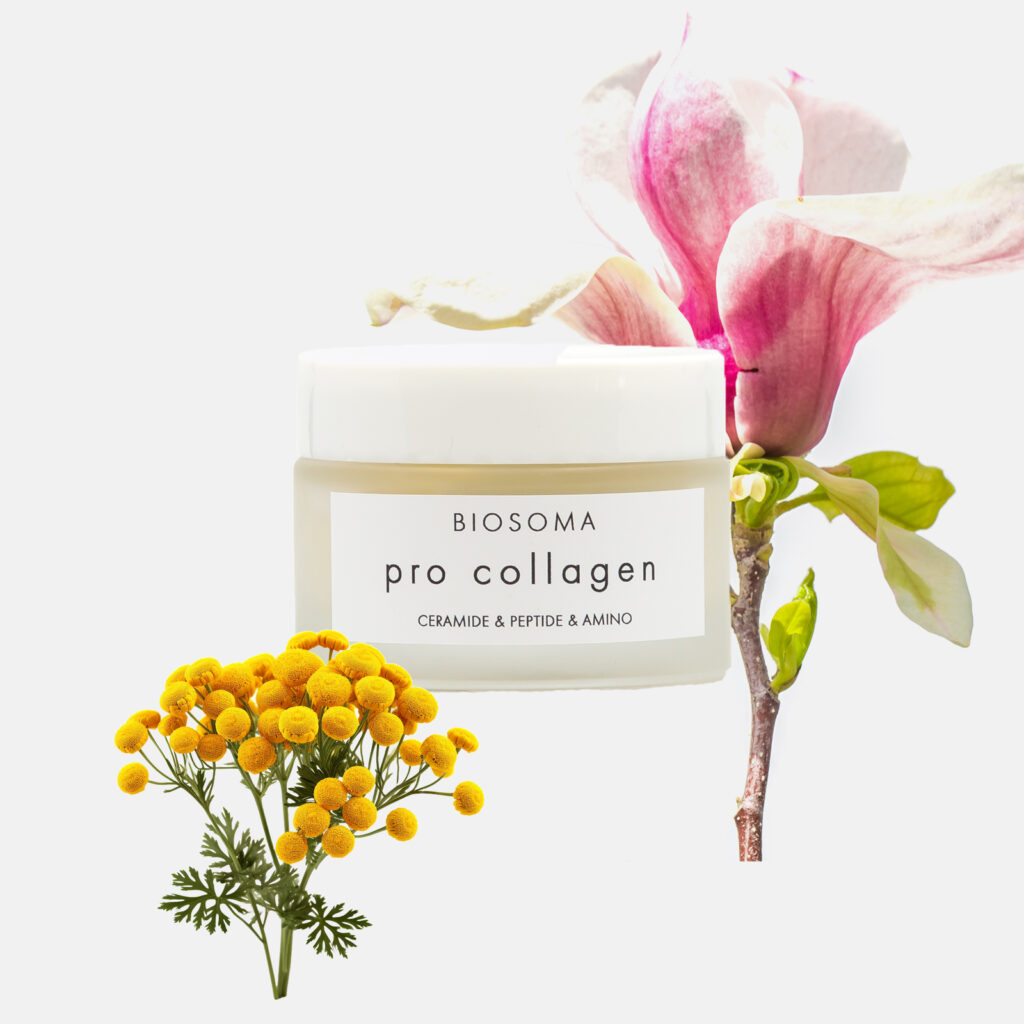Collagen – what is it?
Collagen is the fundamental structural protein of the skin, responsible for its firmness, elasticity and youthful appearance. Its synthesis in the body is a complex process, requiring the presence of specific amino acids and cofactors such as vitamin C. In recent years, cosmetics with collagen and collagen supplements for drinking have gained popularity, but can we talk about their effectiveness? Or perhaps it is worth paying attention to alternative methods of supporting collagen production, such as a proper diet or the use of cosmetics containing key active ingredients.
Collagen face cream – does it really work?
Many sources state that collagen molecules are too large to be introduced into the skin. The smallest collagen hydrolysate molecules (already cut) are about 1000 Da, which is still too much. One study describing the absorption of collagen particles reported that in the best case scenario, when the concentration of collagen in a cream is 2% (and show me such a cream!) and using the right formulation with oil and surfactant, we will get a permeability of only 7%. Moreover, not enough clinical studies have been conducted to support the idea that the introduction of collagen would lead to the production of collagen in our skin. So what is the upside of collagen-infused creams? Well, one that will moisturize and improve sensory properties.
Collagen supplementation or does it make sense?
Drinking collagen supplements are often advertised as an effective way to improve the condition of the skin, and the number of formulations available continues to grow. As we remember from our biology lessons at school, proteins in the gastrointestinal tract are digested into peptides and amino acids (collagen in its form does not penetrate the intestinal wall and travel to the facial skin). What’s more, proper protein digestion occurs only at very low stomach pH, and unfortunately, people who eat processed foods have a problem with this. High pH (although still acidic) adversely affects digestion, so the bioavailability of essential amino acids for synthesizing new collagen in the skin is severely limited.
From a Harvard study on people who used collagen supplements, initial results were promising – improvements in skin firmness, elasticity and moisture content were noted, and wrinkles became less visible. However, the studies were not properly conducted, and it was not clear whether these skin improvements were actually due to collagen. Most of the studies used commercially available supplements that contained, in addition to collagen: vitamins, minerals, antioxidants, coenzyme Q 10, hyaluronic acid and chondroitin sulfate (supports joint function and inhibits osteoarthritis). Honest meta-analyses are lacking.
And besides, as they say, you don’t have to eat hair to grow hair 😉
Collagen synthesis in the body – the role of vitamin C and amino acids
The process of collagen synthesis in the body begins in fibroblasts – skin cells responsible for the production of structural proteins. The key amino acids that must be present in the body to take part in this process are glycine, proline and lysine (I would add that lysine also prevents collagen-digesting enzymes from binding). Vitamin C plays an important role as a cofactor of proline and lysine hydroxylating enzymes and is essential for the formation of a stable collagen structure. Studies have shown that the presence of vitamin C increases collagen synthesis in human skin fibroblasts, highlighting its importance in maintaining skin health.
In order to build collagen, other ingredients are needed, without which the process will not start. These are: copper (present in green tea), vitamin A (carrot seed oil), biotin, omega 3 acids (flaxseed oil), zinc, vitamin E, sulfur…. That’s it in a nutshell 😉
Natural sources of amino acids and vitamin C
Providing the body with adequate amino acids and vitamin C through the diet is crucial for effective collagen synthesis. Fruits and vegetables, in addition to free and rapidly bioavailable amino acids and vitamins, contain a wealth of other nutrients and minerals that are also involved in collagen production (then there’s water, which is the best way to hydrate our cells). Meat must first be heat-treated and then, after eating, the protein must be denatured in the stomach. Which occurs faster and more efficiently we can deduce for ourselves.



Cream with amino acids, pethidium and ceramides
Supporting a proper diet is undoubtedly the use of cosmetics, the composition of which includes ingredients that can easily penetrate the skin and take part in the synthesis of collagen. Such a cream you will find in our store. Pro collagen contains the right amino acids, peptides, ceramides, vitamins and green tea. Peptides, which are short chains of amino acids, act as signals to the skin, stimulating fibroblasts for increased collagen production. Studies suggest that peptides in cosmetics can also improve skin elasticity and reduce the appearance of fine lines.
Factors that accelerate collagen degradation
1. cigarette smoking – Chemicals in cigarette smoke destroy collagen and elastin. Nicotine narrows blood vessels, which restricts the flow of oxygen and nutrients to the skin.
2. UV radiation (sun and tanning beds) – UV activates enzymes of the metalloproteinases (MMPs) group, which break down collagen. This leads to so-called photoaging: the skin becomes thinner, more flabby and less elastic.
3. excessive sugar consumption (glycation) – Sugar binds to collagen and forms advanced glycation products (AGEs), which stiffen and weaken collagen fibers. The glycation process accelerates aging and can impede natural collagen regeneration.
4. stress and lack of sleep – Chronic stress raises cortisol levels, which reduces collagen synthesis. Sleep is the time when fibroblasts work hard to regenerate – its absence means less collagen production.
5. alcohol – Dehydrates the skin and causes oxidative stress, which impairs the ability of cells to produce collagen.
6 Inflammation and oxidative stress – Chronic inflammation (e.g., from poor diet, pollution, skin diseases) activates enzymes that destroy collagen.
Summary
Effective collagen synthesis in the skin requires the presence of key amino acids and vitamin C and their adequate supply to the body. Drinking collagen supplementation may be less effective in cases of protein digestion disorders caused, for example, by inadequate stomach pH. Therefore, it is advisable to pay attention to a balanced rich diet and use cosmetics containing ingredients that easily overcome the skin barrier, and avoid situations that promote the destruction of collagen.
Of course, this is my opinion, you do not have to agree with it 🙂
Bibliography.
- https://www.sciencedirect.com/science/article/abs/pii/S0378517319307835
- https://www.mdanderson.org/cancerwise/should-i-take-a-collagen-supplement.h00-159462423.html
- https://www.health.harvard.edu/blog/considering-collagen-drinks-and-supplements-202304122911#:~:text=Our %20bodies%20cannot%20absorb%20collagen,skin%2C%20hair%2C%20and%20nails.
- https://www.spandidos-publications.com/or/16/5/943/download
- Other … 🙂

